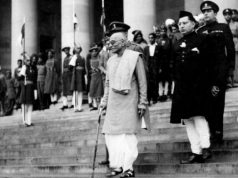(This is the second part of a series of posts, from Minoo Masani’s classic 1944 essay ‘Socialism Reconsidered.’ The first part of the series can be read here: Minoo Masani | Socialism Reconsidered (1944))
Via Dictatorship?
The second Marxist assumption that needs reviewing is that the Dictatorship of the Proletariat (that is, of the Party on behalf of the Proletariat) is a possible and indeed a necessary transition state to Socialism. The theory was that having served its purpose the dictatorship would evaporate, and indeed, as Lenin following Engels put it: “The State will then wither away.”
What was overlooked was the fact established through history that, in the words of Lord Acton: “Power tends to corrupt and absolute power corrupts absolutely.” In Russia, where it is claimed by the Soviet Government that a classless society has already been achieved, that Government shows not the slightest tendency to relax its complete strangle-hold on individual liberty of every kind, much less to ‘wither away’! Nor is there any indication that in the years to come any democratisation or liberalisation is likely to come.
Marxists often refer to socialist thought before Marx as Utopian. One wonders whether anything can be more Utopian that the touching faith of communists that a dictatorship like that in Russia, which has not hesitated to ‘liquidate’ its political opponents in the Party ranks in lakhs for the past six or seven years in a bloody struggle for power, is going one fine day to awaken to the fact that it has served its historical purpose and must now liquidate the G.P.U. and all the coercive apparatus of the State which must then ‘wither away’! This makes Max Eastman indulge in the quip: “Marx described as Utopian the conception that good men can bring about socialism. Stalinists actually believe that bad men can be relied upon to do so.”
A third Marxist assumption that appears to be unable to stand a review of the past two decades is that socialism can be achieved by appealing to the collective selfishness of the working class and its collective hatred for the property-owning classes. The fact of the clash of interest between different classes in society is, of course obvious. But unfortunately the appeal to the collective selfishness of the workers leads quite as often to their becoming a party to exploitation and injustice. We have already seen how the British working class, being given a minor share in the profits of the Empire, becomes through the Labour Party a party to the perpetuation of imperialism, which is the very antithesis of a world socialist order.
Besides, can one ever get to a superior society based on co-operation and love by appealing to selfishness and hatred? The whole complex of ends and means is here involved. Trotsky, one of the outstanding Marxists of his times, called the class struggle “the law of all laws.” But science tells us that there is no law of all laws.
The Only Alternative
Yet another belief – and one held till now by all socialists – is that socialism is the only alternative to capitalism. I must confess I held this view myself till round about 1937 or 1938. You had somehow to destroy capitalism and then, as day follows night, socialism must dawn. But must it? That old type capitalism is played out is obvious. But will socialism inevitably follow or is there not a third ‘something’ that is likely to emerge? That is a question now being asked by a growing school of thinkers. It is best posed and answered in Burnham’s Managerial Revolution. “Marxists,” says he, “assert, in fact, the following syllogism: since capitalism is not going to last (which we have granted) and since socialism is the only alternative to capitalism, therefore socialism is going to come. The syllogism is perfectly valid but the conclusion is not necessarily true, unless the second premise is true and that is just the problem in dispute.”
Is it not likely then that the breakdown of capitalism will be followed, not by socialism, but by what may be called – to quote Molotov, according to our ‘taste’ – Totalitarian or Fascism or Hitlerism or Stalinism? What makes this probable is that the mass of humanity is not yet equipped intellectually to control a highly organised industrial state machine. From this it does not follow that there is any truth in that old reactionary slogan: You can’t change human nature”! That is nonsense. Marx hits the nail on the head when he says that “all history is nothing but a progressive transformation of human nature. “Human nature has been and is changing all the time.”
Is there no answer then to Professor Hayek’s challenging thesis that the way of total planning is the Road to Serfdom? Must one abandon hope and compromise with reality either by accepting one or other kind of totalitarianism or by reconciling oneself to a maintenance of the muddle and anarchy and waste of old type capitalism? Is that really the choice before each of us? To me it seems that to accept this choice would be for the human spirit to accept defeat. It would be to jettison a noble ideal because it transpires that it does appear to be just round the corner. It is to resort to the disastrous logic of a choice of “the lesser evil.” It is not by an acceptance of such a choice that human beings have led their fellows throughout history to heights not till then achieved. To struggle for larger social aims, whether they are achievable in our own life time or not, is part of an evolved conception of living – of what the ancient Greeks called “the good life.” As against the logic of those who would surrender liberty for the sake of planned economy, I would prefer that of the man who remarked: “The difficult I shall attempt immediately; the impossible a little later.”
In the context of today, only he is a socialist who insists on having both liberty and planned economy. For all such it has become necessary to reconsider the assumptions on which orthodox socialism has so far been based and redefine the means by which one may hope to achieve the end.
The questioning of the four assumptions of Marxism that we have found necessary amounts perhaps to nothing more than a shifting of the emphasis which the socialist must lay in the remaining period of the twentieth century. Looked at in this light, the nationalisation or State ownership of property needs definitely to be put in its proper place. Now that it is seen that what matters is not ownership so much as control of property, nationalisation is no longer the kernel of the matter. Besides, it is coming whether we want it or not. Economic necessities are driving inexorably towards it. The thing is to be ready to face its implications in the political and social sphere, to make sure that collectivised economy will not entail a totalitarian polity.
(You can access the original piece here. Visit indianliberals.in for more works by Indian Liberals dating back to the 19th Century.)
Post Disclaimer
The opinions expressed in this essay are those of the authors. They do not purport to reflect the opinions or views of CCS.






